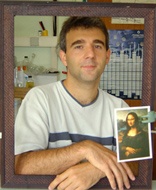 Dr. Jerome Cavaille and his team at the University of Toulouse in France recently received a three-year grant from the French Foundation for Medical Research for the project "Prader-Willi syndrome and C/D small nucleolar RNA genes." They hypothesize that PWS may represent a novel example of a growing list of ribosomal diseases, i.e. diseases caused by abnormalities in ribosome synthesis and/or function.
Dr. Jerome Cavaille and his team at the University of Toulouse in France recently received a three-year grant from the French Foundation for Medical Research for the project "Prader-Willi syndrome and C/D small nucleolar RNA genes." They hypothesize that PWS may represent a novel example of a growing list of ribosomal diseases, i.e. diseases caused by abnormalities in ribosome synthesis and/or function.
The award of 323,388 Euros will build upon the 2015 FPWR–funded project "Biological and molecular functions of PWS-encoded small nucleolar RNA genes." Through this work, Dr. Cavaille and his team are deciphering the function of the PWS snoRNAs–more on that below.
Noncoding RNAs
As taught in introductory biology, the main role of RNA is to be the "messenger," carrying information from the cell's DNA and serving as a template for the machinery that makes proteins. However, researchers are finding that many parts of the DNA produce RNA molecules that are not translated into proteins, so-called "noncoding RNAs." One of the DNA portions in the "missing" PWS region produces many of these noncoding RNAs, belonging to the family of C/D snoRNAs (SNORD116). Although SNORD116 was identified 15 years ago, its exact molecular function still remains a matter of active and lively debate.
Ribosomal Disease Research
Today, we still don't know whether SNORD116 plays some roles in the production of ribosomes or whether it plays other unsuspected roles. Thanks to the use of cells derived from Prader-Willi patients, Dr. Cavaille's group is deciphering the mode of action of this peculiar C/D snoRNA. They're investigating the possibility that PWS could be one of a growing list of ribosomal diseases, which are caused by abnormalities in ribosome synthesis and/or function. Ribosomes play a key role in protein production in the cell.
This type of basic research is essential to provide novel insights into the significance of SNORD116–mediated gene regulation, with important medical repercussions for our understanding of the etiology of Prader-Willi syndrome.








